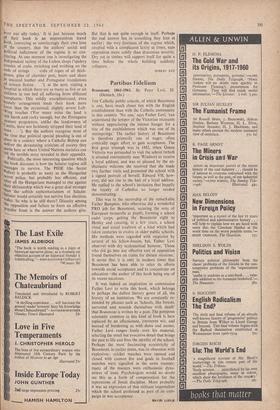Partibus Fidelium
Beaumont, 1861-1961. By Peter Levi, SJ. (Deutsch, 18s.) Beaumont, 1861-1961. By Peter Levi, SJ. (Deutsch, 18s.)
Tiff-. Catholic public schools, of which Beaumont is one, have much closer ties with the English establishment than with the Catholic community in this country. `No one,' says Father Levi, 'can understand the temper of the Victorian recusants without appreciating the intense hunger for a bite of the establishment which was one of its mainsprings.' The earlier history of Beaumont is therefore primarily one of eager, often comically eager effort to gain acceptance. The first great triumph was in 1882, when Queen Victoria was persuaded to visit the school (which is situated conveniently near Windsor) to receive a loyal address, and was so pleased by the en- thusiastic welcome she received that she made two further visits and presented the school with a signed portrait of herself. Edward VII, how- ever, did not rise to the bait of a loyal address. He replied to the school's invitation that happily the loyalty of Catholics no longer needed demonstrating.
This was in the rectorship of the remarkable Father Bampton, who otherwise did a wonderful PRO job for Beaumont, securing the sons of European monarchs as pupils, forming a school cadet corps, getting the Beaumont eight to Henley and creating, in a few years, a school ritual and social tradition of a kind which had taken centuries to evolve in older public schools. His methods were regarded with suspicion by several of his fellow-Jesuits, but, Father Levi observes with dry ecclesiastical humour, 'Those who did go into any effective sort of opposition found themselves on trains for distant missions.' It seems that it is only in modern times that Beaumont has been able to relax its efforts towards social acceptance and to concentrate on education—the author of this book being one of its recent successes.
It was indeed an inspiration to commission Father Levi to write this book, which belongs to perhaps the dullest literary genre of all, the history of an institution. We are constantly re- minded by phrases such as 'Schools, like forests, surround and nourish themselves with death' that Beaumont is written by a poet. The pompous solemnity common in this kind of book is here replaced by an affectionate, irreverent wit; and instead of burdening us with dates and names, Father Levi ranges freely over his material, selecting the small but evocative detail that brings the past to life and fixes the identity of the school. Perhaps the most fascinating eccentricity of Beaumont, in earlier times, was its obsession with explosives: cricket matches were opened and closed with cannon fire and goals in football matches were signalled in the same manner; many of the masters were enthusiastic dyna- miters of trees. Psychologists would no doubt see this as a form of compensation for the repressions of Jesuit discipline. More probably it was an expression of that militant imperialism which the school 'professed as part of its cam- paign to win acceptance.
DAVID LODGE










































 Previous page
Previous page